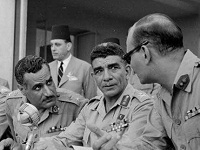60 years ago, Egypt opened new era for Middle East
The event, which occurred in Egypt 60 years ago, opened a new era in the history of the country and exerted great influence on the further development of the Middle East. On July 23, 1952, a group of young officers conducted a military coup in Cairo. The monarchy was overthrown: Egyptian King Farouk was forced to abdicate.

Most historians believe that the monarchical regimes in Egypt and Sudan are "rotten." Sooner or later, the power of King Farouk, who did not enjoy popularity with his people at all, was supposed to fall. The unsuccessful war in alliance with other Arab states against Israel became the last adventure of the monarch of Egypt. The act of aggression undertaken against the young Jewish state failed.
Israel began the retaliatory operation against the army of Egypt on December 22, 1948. The Israelis managed to cut a military group of the enemy's main forces in the Gaza Strip. The remains of the Egyptian troops were forced to retreat. The war ended with the complete destruction of the coalition of Arab countries. Farouk became even more unpopular in Egypt. The ruling regime turned out to be completely responsible for the defeat. Indeed, the command was extremely inefficient.
In the early 1940s, a group of officers established a secret society, which soon began to prepare for a military coup. Gamal Abdel Nasser chaired Free Officers organization immediately after the War of Independence. The little-known young officer was destined to become one of the key leaders in the Middle East in five or ten years. Coming from a family of a simple postal employee, Gamal was not special among his peers during his youth. Moreover, he would often be described as a secluded and hypochondriac boy. Gamal Nasser had a difficult childhood: his parents would often move, so he had to go to many different schools. Later, Nasser showed interest in a military career, which determined his fate.
The rebels enjoyed unconditional support of the masses, and a group of army officers managed to conduct a revolution in Egypt in just a few days. There were hardly any clashes during that revolution. In Cairo, two soldiers were killed during the seizure of government buildings. However, the July events were preceded with massive demonstrations against the British colonialists in January 1952.
The power passed into the hands of the Revolutionary Command Council, which was announced on the radio. It was technically a military coup, although in fact it was a revolution which Soviet historians labeled "an anti-imperialist" revolution. Neither the USSR nor the West attached due importance to those events at first, because military coups would take place in Africa on a regular basis.
After the expulsion of King Farouk, Egyptian revolutionaries united around the idea of national unity. In January 1953, all political parties were dissolved; their property was confiscated. The power became concentrated in the hands of the RCC. The changes marked the creation of a secular dictatorship. The Muslim Brotherhood began to suffer from persecution soon too, even though they also took part in the Egyptian revolution. The role of Gamal Abdel Nasser in the events of 1952-1953 was not conspicuous at first. General Muhammad Naguib de facto became the ruler of the country. He was supporting the cooperation with Britain. However, the majority of officers were opposed to any preservation of colonial oppression, so Naguib's supporters were in the minority. In 1954, Gamal Abdel Nasser finally managed to remove the general from power and stood at the head of the Revolutionary Command Council. Thus, Nasser's election as the President of the Republic in 1956 was a predetermined event.
The nationalization of the Suez Canal became one of the main achievements of Gamal Nasser as a politician. Egypt's decisive struggle against the European domination provoked the wrath of the United Kingdom and France. The great powers began a war against Egypt with the support of Israel in 1956. Only the intervention of the Soviet Union and the United States that were not interested in an escalation of violence in the region, forced the French and the British troops to retreat. Since that time, Egypt began to play a more prominent role in the Middle East. Gamal Nasser became a symbol of Arab unity. The Egyptian president even managed to briefly unite Syria and Egypt into one state. His reign marked the beginning of the era of secular dictatorship that ended only in 2011 when President Hosni Mubarak was toppled.
The Muslim Brotherhood, the movement that was subjected to persecution half a century ago, played an important role in the Egyptian revolution in 2011. Today the world is watching the old guards leaving - the people who were building the new Egypt after the revolution, which put an end to the monarchical rule in the country.
However, despite the official recognition of the election victory of Mohammed Mursi, the situation in Egypt is still shaky. His opponent, Ahmed Shafik, who obtained 48% of votes, united the liberal forces. As soon as the election results were announced, thousands of Shafik's supporters took to the streets of Cairo. A lot will now depend on whether new President Mohammed Mursi, who took oath on June 30, reconciles various political forces in the country.
Yuri Sosinsky-Semikhat
Pravda.Ru
Subscribe to Pravda.Ru Telegram channel, Facebook, RSS!


